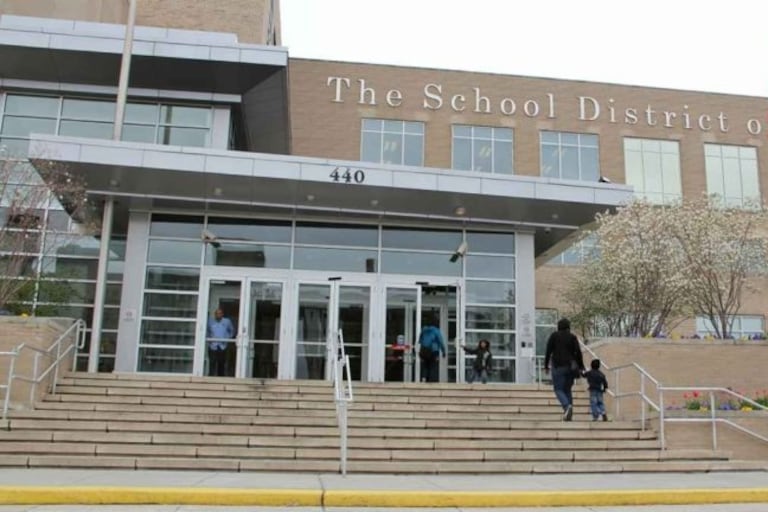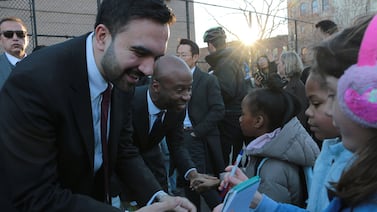Philadelphia Superintendent Tony Watlington announced Thursday that the school district will further revise its process for admission to its most selective schools, based on recommendations from a consulting firm hired to study the impact of a lottery system introduced in 2021.
That system was introduced in an effort to increase the proportion of Black and Latino students at the most selective schools — Masterman and Central — and replaced a long-standing process in which principals generally made final admissions decisions. Instead, all students who met minimal requirements based on scores on the PSSA state standardized test, grades, attendance, and behavior records could enter the lottery.
In other business at its monthly meeting, the Board of Education approved more than $205 million in contracts, mandated Juneteenth instruction, and voted not to renew the charter of Southwest Leadership Academy.
In the presentation on the admissions process for selective schools, the consultants, Accenture, recommended that a strict PSSA cutoff should be eliminated as a requirement for several of the schools. In selective schools that start in middle grades, they suggested, students should not have to reapply to continue through the ninth grade.
Accenture conducted a survey of counselors, principals, students, and other stakeholders, in which 45% of principals said they were dissatisfied with the PSSA requirement, Nahomie Louis and Nicole Newman of Accenture told the board.
Additionally, that process gave preference to students in certain ZIP codes, primarily in North and West Philadelphia, who were historically underrepresented at Masterman and Central. That provision has been challenged by a group of parents who say it is a “blatantly unconstitutional race-based system.”
The consultants said that only 20% of persons surveyed said they liked the lottery process. And, based on data so far, that system has made only halting progress in reaching its goal and had unintended consequences. While the demographics at Central and Masterman showed slight increases from 2021-22 to 2022-23 in the proportion of Black and Latino students, it left hundreds of vacancies in some of the city’s other criteria-based schools, mostly those that had high Black enrollment.
Students also don’t appear to be in favor of the lottery system. Accenture’s survey found that 54% of students said they wanted to remove the lottery, and 38% said if it continues, they wanted to be able to rank their schools of choice rather than just submit a list of five.
Under the current process, students can get into all five schools or none, and they could get into a school or schools they really don’t want to attend while being shut out of their first choice.
Accenture consultants studied the systems in other cities, including Chicago, New York, and Washington, DC as part of their review. They found those cities more precisely tailored their plans to local circumstances and preferences.
“Many other districts already optimized their systems and curated them based on the needs of students,” they said, recommending that Philadelphia similarly “customize” its process. They also said Philadelphia should hire a staff dedicated to overhauling the process and have revisions and improvements in place by fall 2025.
Accenture has a $298,000 contract to evaluate the school selection process.
Board approved millions for building maintenance, tech, asbestos abatement
The board considered 104 separate items. Through its consent agenda, in which many items are voted on in a bloc with little or not discussion, the board voted to approve more than $205 million in spending on school building maintenance, food, lease agreements, an “instructional management system,” and more.
Some of the big ticket items:
- $26.3 million for Contract with NCS Pearson for Schoolnet Instructional Management System, which comes on top of a $70 million expenditure approved at the last meeting for new curricular materials in reading, math, and science.
- $69 million on an agreement with a city agency, the Philadelphia Authority for Industrial Development (PAID), to aid with capital projects involving the building and renovation of school buildings.
- $24 million for “Contracts with Various Vendors for Asbestos Abatement in Various Schools”
- $20 million for “Contracts with Various Vendors for Professional Environmental Design and Testing Consulting Services.”
Board member Cecelia Thompson voted no on several smaller spending items, including $6 million for snow removal and $300,000 for window shades, saying they came without explanation. Lisa Salley voted no on two resolutions to spend money on outside law firms.
The board also voted to terminate the COVID-19 vaccine mandate for employees (Salley dissented.
Board rejects charter renewal
The board also voted 7-2 not to renew the charter for Southwest Leadership Academy Charter school. The vote came after Rudolph Garcia, who presided over hearings following the board’s first vote to close the school in June, 2022, said Southwest Leadership has not improved its low academic record and is teetering on financial viability. Garcia presided over a hearing held in January and February contesting the board’s intent to revoke the charter.
Last month, the board denied the application to open a Global Leadership Academy high school. That vote and other denials have led some officials to allege that the board is biased against Black-led charters.
Before voting, board members repeatedly asked Garcia if there was any evidence of an upward trend. Garcia, unequivocally, said no.
“If I had seen some progress, if they were still performing below comparison groups, but catching up, I would have seriously considered that they be given more time to do it,” he said. “But that didn’t happen.”
He noted the pandemic was disruptive, but said all schools had to cope with that. “Everybody was affected, but the relationship between them and the other comparison groups didn’t change,” Garcia said.
The K-8 school, founded in 2007 with just over 600 students, was trying to expand, but “got ahead of their skis,” Garcia said. It bought property to build a new school, but were not able to enroll enough students to justify or pay for the expansion, he said.
Board member Lisa Salley, who voted no on the closure along with Cecelia Thompson, said she was concerned that the audit of the school’s finances seemed “biased.” “I don’t see the objective evidence to support” the nonrenewal recommendation, she said.
Parent Robyn Fernandes, who has children at the school, disputed Garcia’s conclusions, saying that the enrollment is 92% Black, and those students outperform Black students in other charters and in comparable district schools.
She upbraided the board members for never visiting the school or taking to parents and the community about its positive impact on students. “No one has had a conversation with us,” she said. “No one has set foot in the school.”
At its May meeting, the board voted down an application of Global Leadership Academy.
Peng Chao, director of the board’s Charter Schools Office, said that 14 charters are up for renewal this year with a total enrollment of 14,000 students, one of the largest cohorts ever considered at one time.
Chao gave more detailed information on five of those schools that do not meet standards in one of more categories: Deep Roots, KIPP North Philadelphia, Mastery Prep Elementary, Mathematics Civics and Sciences, and Christopher Columbus.
Mathematics Civics and Sciences also failed to meet standards for organizational compliance. And Chao noted that while the school reports a 100% graduation rate, the performance of its students on Keystone exams measuring proficiency in math, language arts, and sciences fall below comparable schools.
Christopher Columbus met academic standards, but failed to meet organizational compliance benchmarks.
He recommended that Columbus be renewed for five years with conditions, while the others be renewed for just one year with conditions.
At the meeting, Watlington also said that 10th through 12th graders at Frankford High School, which had been closed due to asbestos, would return in September to a refurbished wing in the school. Officials had previously announced that the building would not be open next school year and all students would be relocated.
Now, only ninth graders will go elsewhere, to the third floor of Clemente Middle School, Watlington said. An assistant principal and other staffers will be on that site and students will be provided transportation back to Frankford for afterschool and other out-of-school-time activities, said Associate Superintendent for High Schools Tomas Hanna.
Students will be required to learn about Juneteenth
The board also approved a resolution to make sure all students learn about Juneteenth, but amended the original resolution that said it should be taught “in all content areas” from grades kindergarten through 12th. It now says Juneteenth lessons should be taught “to all students where appropriate in the curriculum” starting in 2023-24.
Juneteenth is a national holiday that commemorates the end of slavery in the United States. Although President Lincoln issued the Emancipation Proclamation, which declared “all persons held as slaves” in Confederate states shall be free, on January 1, 1863, freedom for many would only be gained later. On June 19, 1865, Union soldiers informed enslaved people in Galveston, Texas, that they were free people; and this event, eventually known as Juneteenth, became a celebration of independence for Black people.
At Thursday’s board meeting, Watlington, a former history teacher, noted that most persons of African descent lived under slavery for 246 years – from the first arrival of enslaved Africans to English colonies in 1619 to the abolition of slavery in 1863, and then under Jim Crow segregation for another 100. And their civil and voting rights “continue to be under attack” in some parts of the country, he said. .
The board resolution calls for the school district to collaborate with educators, administrators, and community partners to develop and provide age-appropriate instructional resources, materials and professional development opportunities that support the teaching of Juneteenth.
The district will also engage parents, families, and community members by offering resources, hosting events, and promoting dialogue to enhance understanding and appreciation of Juneteenth and Black history.
Dale Mezzacappa is a senior writer for Chalkbeat Philadelphia, where she covers K-12 schools and early childhood education in Philadelphia. Contact Dale at dmezzacappa@chalkbeat.org.






